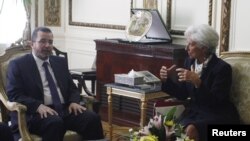CAIRO — International Monetary Fund head Christine Lagarde met with Egyptian President Mohamed Morsi Wednesday to begin negotiations on a $4.8-billion loan to help the Egyptian economy recover after months of political turmoil.
Egypt's Prime Minister Hisham Qandil told reporters that an International Monetary Fund loan would lower Egypt's borrowing costs, reducing the burden of an ongoing budget shortfall. "The lending terms become a lot cheaper and that will have a direct benefit to reducing the budget deficit by reducing the cost of lending for this country," he stated.
IMF chief Christine Lagarde met with Egyptian President Mohamed Morsi, Qandil, and other top officials to discuss the fiscal package. A $2.8-billion loan fell through last year after months of political wrangling.
Egyptian Finance Minister Momtaz el-Said told Arab media that the loan was needed to fill the gap in the country's annual budget stemming from a decline in tourism and foreign investment. Egypt's fiscal year began in July and a major budget shortfall is looming.
Lagarde told reporters that the loan Egypt has requested is intended to improve the general health of the country's economy and therefore benefit its people. "The objective is to improve stability, to restore confidence, with a view to encouraging investors to invest and create jobs to reduce the financial burden of very high financing terms," she said. "Clearly it will require determination, political courage. It will have its short term imperatives financially and its medium to long-term determination. It has a fiscal dimension, it has a monetary dimension and it has a structural reform dimension."
Lagarde described the process of approving the loan as a "journey" that the IMF was taking in partnership with Egypt. She added that once agreed upon, the money would be spread out in a number of payments.
Khattar Abou Diab, who teaches political science at the University of Paris, says that it is probable that Mr. Morsi will want to go ahead with the deal.
He says that Morsi's Muslim Brotherhood faction has championed Western-style economic liberalism, so it is unlikely that the loan will be contested as long as the terms are fair.
Analyst Omar Ashour, who heads the Middle East program at the University of Exeter in Britain, says Mr. Morsi is eager to have the loan money, since he "needs to fulfill pledges he has made on the economy." Ultimately, says Ashour, "he needs to live up to those pledges in order to be re-elected."
Egypt's Prime Minister Hisham Qandil told reporters that an International Monetary Fund loan would lower Egypt's borrowing costs, reducing the burden of an ongoing budget shortfall. "The lending terms become a lot cheaper and that will have a direct benefit to reducing the budget deficit by reducing the cost of lending for this country," he stated.
IMF chief Christine Lagarde met with Egyptian President Mohamed Morsi, Qandil, and other top officials to discuss the fiscal package. A $2.8-billion loan fell through last year after months of political wrangling.
Egyptian Finance Minister Momtaz el-Said told Arab media that the loan was needed to fill the gap in the country's annual budget stemming from a decline in tourism and foreign investment. Egypt's fiscal year began in July and a major budget shortfall is looming.
Lagarde told reporters that the loan Egypt has requested is intended to improve the general health of the country's economy and therefore benefit its people. "The objective is to improve stability, to restore confidence, with a view to encouraging investors to invest and create jobs to reduce the financial burden of very high financing terms," she said. "Clearly it will require determination, political courage. It will have its short term imperatives financially and its medium to long-term determination. It has a fiscal dimension, it has a monetary dimension and it has a structural reform dimension."
Lagarde described the process of approving the loan as a "journey" that the IMF was taking in partnership with Egypt. She added that once agreed upon, the money would be spread out in a number of payments.
Khattar Abou Diab, who teaches political science at the University of Paris, says that it is probable that Mr. Morsi will want to go ahead with the deal.
He says that Morsi's Muslim Brotherhood faction has championed Western-style economic liberalism, so it is unlikely that the loan will be contested as long as the terms are fair.
Analyst Omar Ashour, who heads the Middle East program at the University of Exeter in Britain, says Mr. Morsi is eager to have the loan money, since he "needs to fulfill pledges he has made on the economy." Ultimately, says Ashour, "he needs to live up to those pledges in order to be re-elected."




